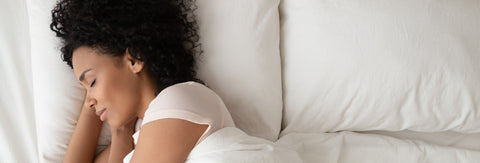Ladies, do you chafe at the sound of nearby males bragging about how great they feel after only 6 hours of sleep, yet you're gripping on to the 7 hours you got while regretting last night's bedtime procrastination? Well, that may be because women need more sleep than men. Researchers and scientists are beginning to delve deeper into exactly why. So, grab your favourite cup of tea, fluff up your pillows, and let’s uncover the reasons why women require that extra snooze time.
The Science of Sleep
Sleep is a complex process influenced by a variety of biological and psychological factors, which can differ significantly between sexes. More specifically, research reports that 55% of women aged 18 to 64 claim to have trouble getting to sleep or staying asleep compared to 43% of men.1
To have restful sleep, many complex processes need to be in motion. Your sleep clock needs to be active, signaling when it’s time to sleep and wake. Next, the sleep hormone – melatonin – needs to be released in response to darkness, which ultimately works with the sleep clock to signal bedtime.
Women may have more difficulty falling asleep or staying asleep during different life stages like:
- Menstruation:
The hormonal changes during this time of month influence stage 2 and REM sleep in women, along with melatonin levels.2 This could be the reason why one-third of menstruating individuals complain of having trouble sleeping.3
- Pregnancy:
Some compromises are made when growing a tiny human, sleep being one of them. Frequent urination, body movements, uncomfortable sleep positions, restless leg syndrome, and sleep apnea are common during pregnancy, so common that 78% of women complained of more disturbed sleep during pregnancy than any other time in their lives.5
- Menopause
Night sweats and hot flashes are experienced by as many as 85% of menopausal women, resulting in disturbed and unrefreshed sleep. Sleep apnea, which can be technically defined as changes in breathing during sleeping, is also more likely in menopause, resulting in poor quality sleep, daytime fatigue, and napping.3
- Life!
Women may also need more sleep due to the differences in gender roles at home. Research shows that women tend to do more caring for family members and have more social commitments than men.6 Women are also more likely to have their sleep interrupted, due to tending and caring for little ones at night, which often results in poorer sleep quality.6
How much more sleep do women need?
The answer may surprise you. Women may need an average of 11 minutes of extra sleep,3 while other research indicates women can sleep up to 28 minutes more than men.6 Other studies show that women fall asleep faster than men, indicating more fatigue than men.3 While more research needs to be done about the sex-specific differences, there is no doubt that adults –regardless of sex – need an average of 7 hours in general.
How to achieve better sleep:
If you’re feeling fatigued in the morning, it’s a sign that your body needs more rest. Here’s what to do:
- Establish a bedtime routine and stick to it. This will help regulate your circadian rhythm and melatonin production.
- Avoid blue light from TVs, phones, and laptops. Try using a blue light-blocking app or opt for blue light-block glasses if you absolutely must use any screens.
- Try relaxing exercises before bed, like gentle stretching, deep breathing, and meditation, to decrease stress.
- Avoid stimulants like coffee before bed. Instead, opt for soothing herbal teas like chamomile.
- Supplement with Jamieson’s Melatonin Gummies, to help improve sleep quality.
There are many factors, hormonal and social, that explain why women need more sleep than men. Embracing good sleep hygiene, recognizing the signs of sleep disorders, and making concerted efforts to address and mitigate the factors that disrupt sleep are crucial steps for anyone looking to improve their sleep quality.
References:
- Chaput, J.-P., Wong, S. L., & Michaud, I. (2017, September 20). Duration and quality of sleep among Canadians aged 18 to 79. https://www150.statcan.gc.ca/n1/pub/82-003-x/2017009/article/54857-eng.htm
- Jehan, S., Auguste, E., Hussain, M., Pandi-Perumal, S. R., Brzezinski, A., Gupta, R., Attarian, H., Jean-Louis, G., & McFarlane, S. I. (2016). Sleep and Premenstrual Syndrome. Journal of sleep medicine and disorders, 3(5), 1061.
- Do women need more sleep than men?. Sleep Foundation. (2023, August 1). https://www.sleepfoundation.org/women-sleep/do-women-need-more-sleep-than-men#do-women-actually-sleep-more-than-men--2
- Al-Musharaf S. Changes in Sleep Patterns during Pregnancy and Predictive Factors: A Longitudinal Study in Saudi Women. Nutrients. 2022 Jun 25;14(13):2633. doi: 10.3390/nu14132633. PMID: 35807814; PMCID: PMC9268456.
- National Sleep Foundation Pregnancy and Sleep. [(accessed on 25 May 2022)]. Available online: http://sleepfoundation.org/sleep-topics/pregnancy-and-sleep
- Burgard, S. A., & Ailshire, J. A. (2013). Gender and Time for Sleep among U.S. Adults. American sociological review, 78(1), 51–69. https://doi.org/10.1177/0003122412472048




